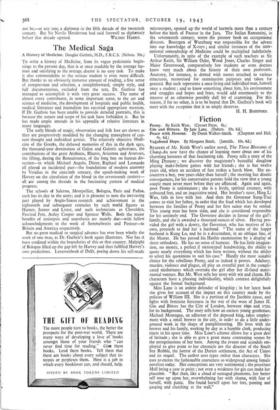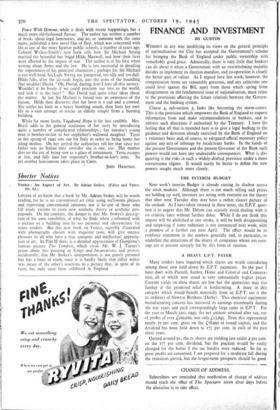Fiction
Peony. By Keith West. (Cresset Press. 8s.) Gin and Bitters. By Jane Lane. (Dakers. 10s. 6d.) Peace with Honour. By Derek Walker-Smith. (Chapman and Hall.
9s. 6d.) Vagabond Hope. By Margaret Brash. (Jarrolds. 10s. 6d.)
READERS of Mr. Keith West's earlier novel, The Three Blossoms of Chang-An now have the chance of learning more about one of his charming heroines of that fascinating tale. Peony tells a story of the Ming Dynasty ; we discover the magistrate's beautiful daughter playing make-believe games with her friends ; she is but twelve years old, when an accident of fate strikes a harsh blow. She en- counters a boy, two years older than herself ; the meeting has drastic consequences, for his conservative parents hold the view that a young couple must never meet before they are affianced. Again and again, poor Peony is unfortunate ; she is a lively, spirited creature, with unbound feet, and an inquisitive mind. Her brother's tutor, Hing Li Wan, falls in love with her. And then the Governor Sung-Tsui comes to visit her father, in order that the feud which has developed between the families of Peony and her first suitor may be settled. This young man has been slain, and she is considered responsible for his untimely end. The Governor decides in favour of the girl's family, and she is awarded a thousand ounces of silver. Having pro- vided the girl with a dowry, the Governor, who has motives of his own, proceeds to find her a husband. "The name of the happy husband is Kung Lo, and he is a descendant, in an oblique line, of the Master. He has passed his Hanlin examination by a display of sheer orthodoxy. He has no sense of humour. He has little imagina- tion, no money, a perfect if stereotyped handwriting, the ability to quote nearly everything which has been written, without the ability to select his quotations to suit his case." Hardly the most suitable choice for the rebellious Peony, and so indeed it proves. Adultery, murder, violence and plague, all play an eventful part in the compli- cated misfortunes which overtake the girl after her ill-fated matri- monial venture. But Mr. West tells her story with wit and charm. His characters have a pleasing individuality, which contrast delightfully against the formal background.
Miss Lane is an ardent defender of kingship ; in her latest book she gives her account of the impact on this country made by the policies of William III. She is a partisan of the Jacobite cause, and fights with feminine fierceness in the war of the woes of James H. Gin and Bitters has the City of London, between 1690 and 1720, for its background. The story tells how an earnest young gentleman, Michael Montague, an adherent of the deposed king, takes employ- ment with a small brewer in the city, in order to do a little under- ground work in the shape of pamphleteering. He lives with the brewer and his family, working by day as a humble clerk, producing tracts in his spare time. Miss Lane's scheme allows her a great deal of latitude ; she is able to give a great many contrasting scenes by the peregrinations of her hero. Among the events and scandals em- ployed to give point to her chronicle are the disaster of the South Sea Bubble, the horror of the Darien settlement, the Act of Union and its sequel. The author uses types rather than characters. She uses to excess the fashionable coarseness so widespread among female novelists today. Her conceptions are very sentimental ; the prostitute Moll being a case in point ; not even a weakness for gin can make her plausible. "But then, like a cloud of outraged phantoms, her better self rose up upon her, overwhelming her with shame, with fear of herself, with panic. She found herself upon her feet, panting and gasping and clutching at the wall." Peace With Honour, while it deals with recent happenings, has a much more old-fashioned flavour. The author has written a number of books about legal luminaries, and he, or someone with the same name, published a first novel Out of Step, which was concerned with life at one of the more Spartan public schools, a number of years ago. Colonel Walker-Smith's new book tells how Sir Michael Strang married the beautiful but frigid Hilda Maxwell, and how their lives were affected by the impact of war. The author is at his best when writing about Army and the law. He is less successful in detailing the experiences of his principal characters ; perhaps his Sir Michael is too well-bred, his,Lady Strang too pampered, too silly and too dull. Hilda falls, after the air-raids begin, into the arms of the. bounding (but wealthy) David. "Oh, David, darling, how I hate all this secrecy. Wouldn't it be lovely if we could proclaim our love to the world, and look it in the face?" But David had quite other ideas about the matter. At last Sir Michael is forced into an awareness of the liaison. Hilda then discovers that her lover is a cad and a coward. She settles his hash in a heavy bombing attack, then loses her own life in a vain attempt to rescue an elderly couple from a burning building.
While far more lively, Vagabond Hope is far less credible. Mrs. Brash adds to the general confusion of her story by introducing quite a number of complicated relationships ; her heroine's young man is brother-in-law to her stepfather's widowed daughter. Tessa in the spring of 1940 sets out for Italy in order to bring home her ailing mother. On her arrival the authorities tell her that since her father was an Italian they consider she is one, too. Her mother dies on the eve of being sent to a place of internment. Tessa escapes at last, and falls into her stepsister's brother-in-law's arms. So yet another honeymoon takes place in Cairo.
JOHN HAMPSON.



























 Previous page
Previous page